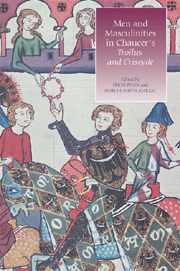Book contents
- Frontmatter
- Contents
- Contributors
- Abbreviations
- Introduction: The Myths of Masculinity in Chaucer's Troilus and Criseyde
- 1 “Beautiful as Troilus”: Richard II, Chaucer's Troilus, and Figures of (Un)Masculinity
- 2 The State of Exception and Sovereign Masculinity in Troilus and Criseyde
- 3 Revisiting Troilus's Faint
- 4 What Makes a Man? Troilus, Hector, and the Masculinities of Courtly love
- 5 Masculinity and Its Hydraulic Semiotics in Chaucer's Troilus and Criseyde
- 6 Masochism, Masculinity, and the Pleasures of Troilus
- 7 “The Dreams in Which I'm Dying”: Sublimation and Unstable Masculinities in Troilus and Criseyde
- 8 “A Mannes Game”: Criseyde's Masculinity in Troilus and Criseyde
- 9 Troilus's Gaze and the Collapse of Masculinity in Romance
- 10 Sutured Looks and Homoeroticism: Reading Troilus and Pandarus Cinematically
- 11 Being a Man in Piers Plowman and Troilus and Criseyde
- 12 “The Monstruosity in Love”: Sexual Division in Chaucer and Shakespeare
- Index
- CHAUCER STUDIES
11 - Being a Man in Piers Plowman and Troilus and Criseyde
Published online by Cambridge University Press: 12 September 2012
- Frontmatter
- Contents
- Contributors
- Abbreviations
- Introduction: The Myths of Masculinity in Chaucer's Troilus and Criseyde
- 1 “Beautiful as Troilus”: Richard II, Chaucer's Troilus, and Figures of (Un)Masculinity
- 2 The State of Exception and Sovereign Masculinity in Troilus and Criseyde
- 3 Revisiting Troilus's Faint
- 4 What Makes a Man? Troilus, Hector, and the Masculinities of Courtly love
- 5 Masculinity and Its Hydraulic Semiotics in Chaucer's Troilus and Criseyde
- 6 Masochism, Masculinity, and the Pleasures of Troilus
- 7 “The Dreams in Which I'm Dying”: Sublimation and Unstable Masculinities in Troilus and Criseyde
- 8 “A Mannes Game”: Criseyde's Masculinity in Troilus and Criseyde
- 9 Troilus's Gaze and the Collapse of Masculinity in Romance
- 10 Sutured Looks and Homoeroticism: Reading Troilus and Pandarus Cinematically
- 11 Being a Man in Piers Plowman and Troilus and Criseyde
- 12 “The Monstruosity in Love”: Sexual Division in Chaucer and Shakespeare
- Index
- CHAUCER STUDIES
Summary
Critics are increasingly studying Chaucer and Langland together, since, as textual scholarship reveals ever more comprehensively, the poets were sometimes copied by the same scribes and in the same workshops and manuscripts. A critical separation between the Canterbury Tales and Piers Plowman is ever being bridged, and Chaucer and Langland are coming to be seen as London poets deeply engaged in the religious and social issues of their day. However, less work has been done to bridge the larger divide between Troilus and Criseyde and Piers Plowman. Why is there such a critical chasm between these two poems, despite the cultural and textual evidence of their connections? For one, the poems, as presented to modern eyes in modern editions, are very different in genre, aesthetics, and poetics and seem to emerge from distinct sensibilities. Troilus and Criseyde, for example, coming from a definitive Continental source, is very Italian, a descriptor seldom applied to Piers Plowman. The poems also engage with different types of love, and fin amour or even basic gender issues, which dominate studies of Troilus and Criseyde, were, until recently, only obliquely addressed by students of Piers Plowman, so much so that a Yearbook of Langland Studies special section was convened to encourage feminist scholarship on the poem.
I would like to contribute to the burgeoning criticism on Chaucer and Langland by considering their poems together as strangely parallel stories of men, Troilus and Will, journeying, questing, and suffering as men in search of truth. Masculinity studies can help us relate the experiences of two characters who have dominated our attention in these colossal texts of English medieval fiction but whose names are seldom heard in the same sentence. Both poets knew that every role, every desire, and all the pressures and obligations of public manhood cannot be divorced from simply “being” male. They therefore use the male bodies of their heroes to explore, through loss and renewal, the nature of Christian civic and personal life.
- Type
- Chapter
- Information
- Men and Masculinities in Chaucer's 'Troilus and Criseyde' , pp. 161 - 182Publisher: Boydell & BrewerPrint publication year: 2008



